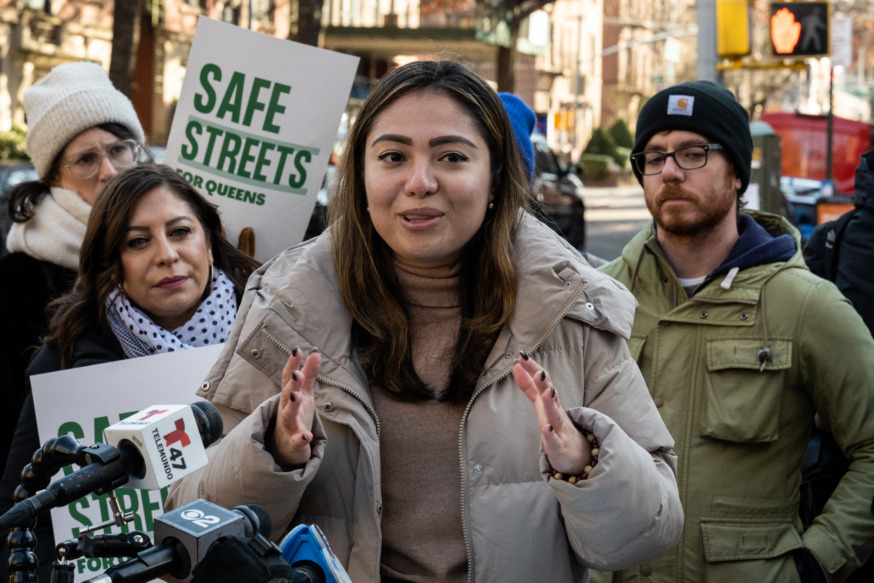
State Senator Kristen Gonzalez speaks at a press conference introducing the Western Queens Street Safety Plan in Astoria on Nov. 28, 2023. (Photo by Gabriele Holtermann)
Nov. 28, 2023 By Gabriele Holtermann
With 2023 shaping up to be the deadliest year for cyclists and pedestrians in western Queens since the implementation of Vision Zero in 2014, lawmakers gathered in Astoria to introduce a blueprint for street safety in western Queens, titled the Western Queens Street Safety Plan.
Traffic fatalities in Queens are up by 43% compared to last year, according to city data. So far this year, 13 people, including 7-year-old Dolma Naadhun, died in traffic-related accidents in western Queens alone, and 939 pedestrians or cyclists have been injured.
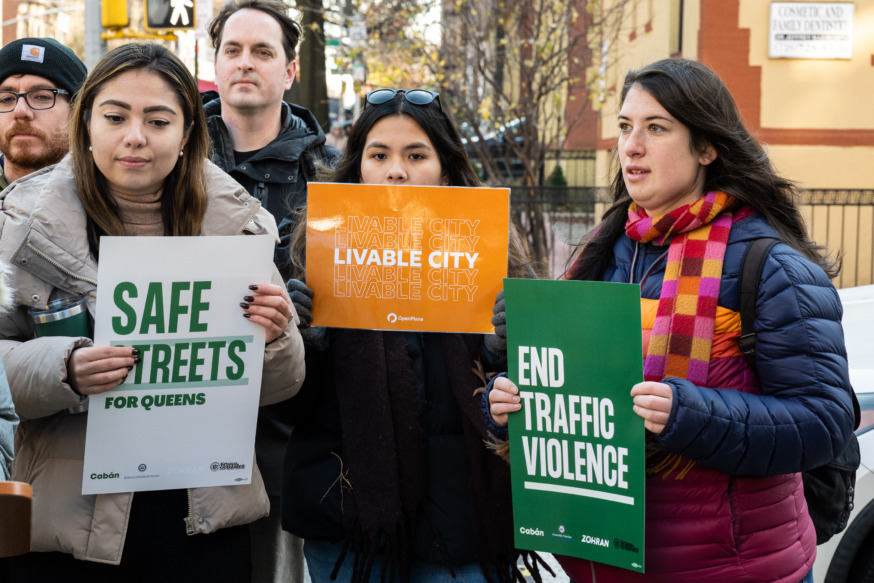
Street safety advocates attend a press conference introducing the Western Queens Street Safety Plan in Astoria on Nov. 28, 2023. (Photo by Gabriele Holtermann)
To combat the alarming rise in traffic fatalities, Council Member Tiffany Cabán, state Sen. Kristen Gonzalez, and Assemblymembers Jessica González-Rojas and Zohran Mamdani joined forces at the intersection of 31st Avenue and 35th Street in Astoria to announce a slew of legislative and infrastructural recommendations to be completed by 2029.
The comprehensive street safety plan includes the following:
- • More protected bike lanes and bike boulevards
- • Increasing the number of speed and red light cameras
- • Enhancing visibility at intersections by removing parking spaces near crosswalks
- • Improving public transit
- • Lowering the speed limit and redesigning streets to slow traffic
Surrounded by street safety advocacy groups and family members who lost loved ones to traffic accidents, Cabán said that every traffic-related death was preventable and described the plan as “full of common sense, easily executed infrastructure improvements that would save lives.
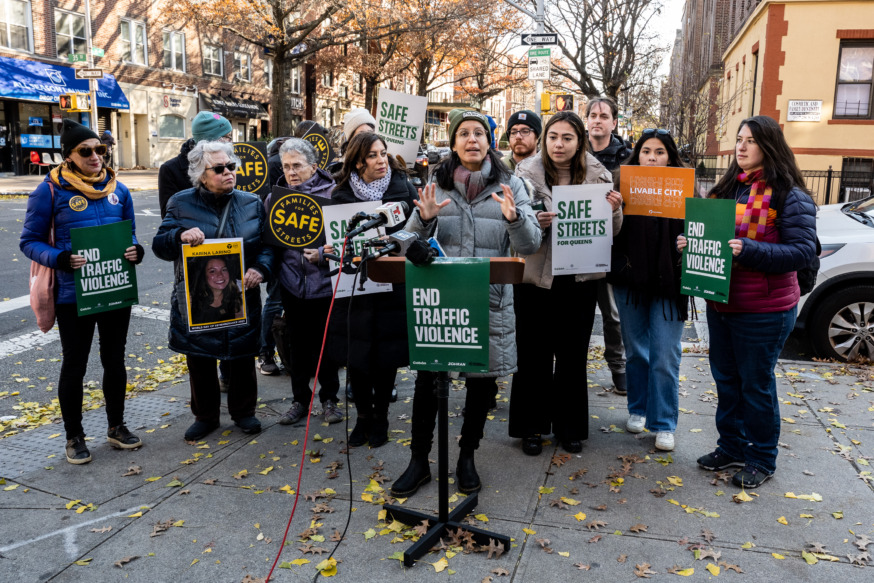
City Council Member Tiffany Cabán speaks at a press conference introducing the Western Queens Street Safety Plan in Astoria on Nov. 28, 2023. (Photo by Gabriele Holtermann)
“While none of the safety improvement measures we’ve outlined will bring back the lives that have been taken from us by traffic violence, we can honor their memory by building a city where car-induced deaths and injuries are a thing of the past,” Cabán added.
Gonzalez pointed out that since the implementation of red light cameras in 1994, New York City saw a 77% decrease in red light violations. Additionally, speed camera violations dropped by 30% after the city implemented 24/7 speed cameras in August 2022.
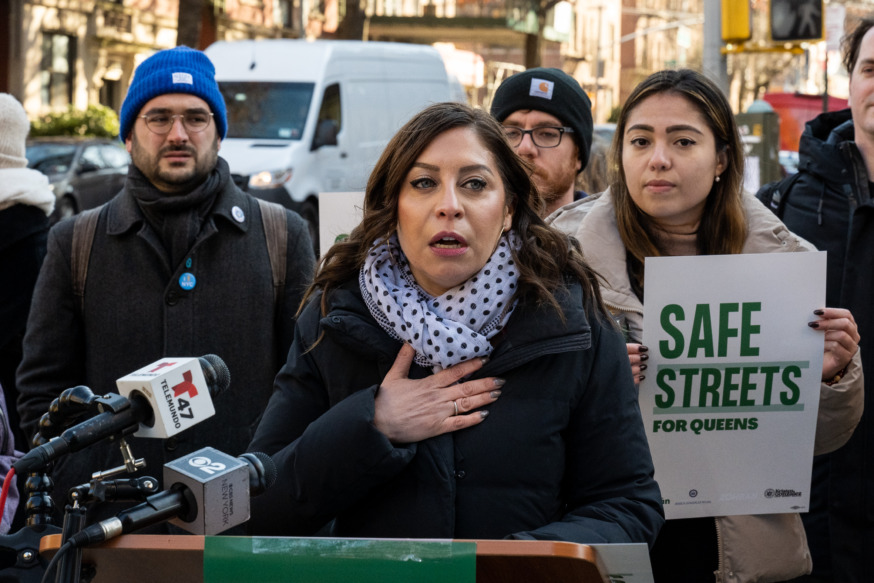
Assemblymember Jessica González-Rojas speaks at a press conference introducing the Western Queens Street Safety Plan in Astoria on Nov. 28, 2023. (Photo by Gabriele Holtermann)
“Again, the numbers tell us that these are effective and necessary,” Gonzalez said. “In the next legislative session, we’re going to continue fighting for these measures, continue to fight for the expansion and stand with every single member in this community from here, down to Brooklyn, to Manhattan, that have been calling for these common-sense changes and make them happen.”
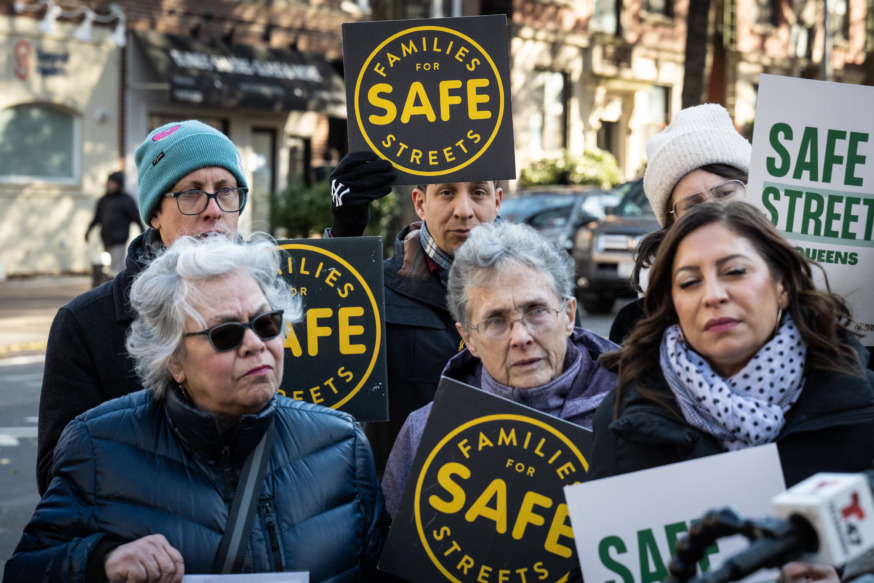
Street safety advocates attend a press conference introducing the Western Queens Street Safety Plan in Astoria on Nov. 28, 2023. (Photo by Gabriele Holtermann)
Laura Shepard, Queens organizer at Transportation Alternatives, explained that while New York state bans parking within 20 feet of an intersection — called “daylighting” — New York City was exempt and drivers could park right up to the crosswalk.
Daylighting removes parking spots closest to an intersection and increases visibility for drivers, making intersections safer for pedestrians and cyclists.
Shepard called the exemption dangerous.
“This year, drivers killed 7-year-old Dolma Naadhun here in Astoria and 7-year-old Kamari Hughes in Fort Greene, Brooklyn,” Shepard said. “Both were walking in crosswalks where parked vehicles hindered visibility. As bigger vehicles with higher hoods and more blind spots are driving on our streets and hindering visibility while parked close to crosswalks, we need to take stronger action to protect children and all vulnerable road users.”
The New York City Council passed a bill requiring the New York City Department of Transportation (DOT) to “daylight” at least 100 intersections per year. However, the bill won’t go into effect until 2025 and street safety advocates say it will make little impact since New York City has over 40,000 intersections.
Shepard pointed out that Jersey City and Hoboken were “significantly” safer for pedestrians because both cities had implemented daylighting.
“Hoboken has had zero pedestrian deaths in almost seven years,” Shepard added.
González-Rojas said that more needed to be done to ensure pedestrian safety and advocated for traffic calming measures like narrower lanes, curb extensions, traffic diverters, and median barriers.
“We have a plan as from next year to 2029 to push for these infrastructure improvements,” González-Rojas said. “And we will do it alongside the advocates here, alongside my elected partners in government, and alongside our advocates in our fight with the DOT and New York City.
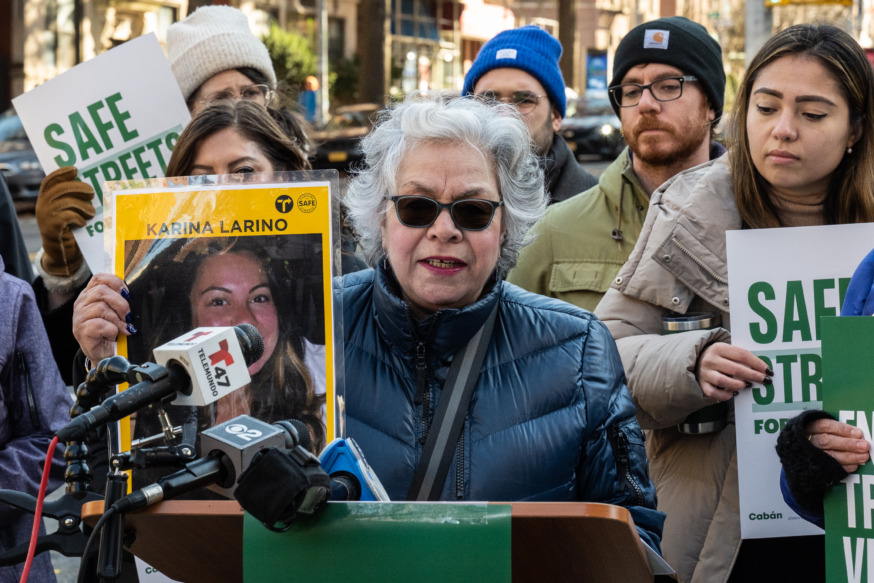
Carmen Larino speaks at a press conference introducing the Western Queens Street Safety Plan in Astoria on Nov. 28, 2023. (Photo by Gabriele Holtermann)
Carmen Larino held a poster with the image of her daughter Karina Larino, who was fatally struck by an SUV when the driver, 73-year-old Panagiota Arvanitopoulos failed to yield the right away at 21st Street and Astoria Park South in May 2022.
Larino said she supported Families for Safer Streets and Sammy’s Law to make sure her daughter didn’t die in vain.
“I support whatever needs to be done to make streets safer for pedestrians or bicyclists,” Larino said.
Astoria resident Julie Huntington’s dad, 65-year-old Kim Huntington, was killed in a traffic accident in 2019 in Ohio.
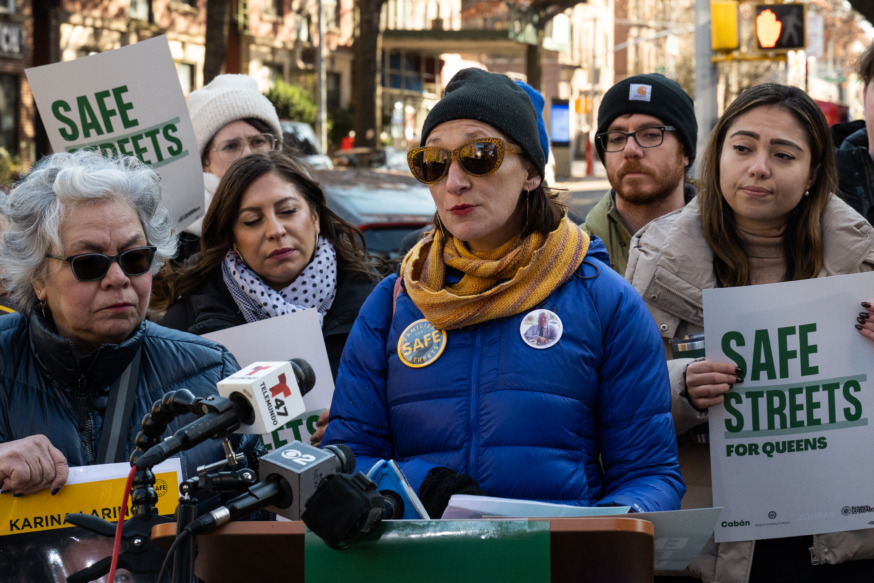
Julie Huntington speaks at a press conference introducing the Western Queens Street Safety Plan in Astoria on Nov. 28, 2023. (Photo by Gabriele Holtermann)
Huntington told the Queens/Astoria Post that traffic violence was a national problem. She was advocating for traffic safety because she didn’t want anyone else to go through the same heartache she and others who have lost family members in traffic accidents.
“We’re fighting for traffic safety improvements nationwide,” Huntington said. “One of the reasons why it’s so important in New York City [is], we are kind of a heartbeat of the country. A lot of times when change happens here, there’s a ripple effect to other cities and other regions.”
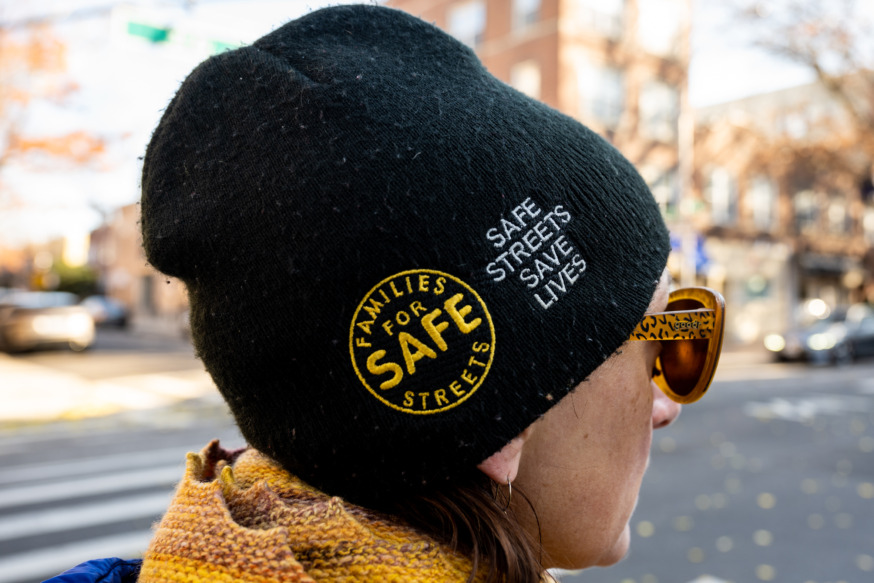
Street safety advocates attend a press conference introducing the Western Queens Street Safety Plan in Astoria on Nov. 28, 2023. (Photo by Gabriele Holtermann)
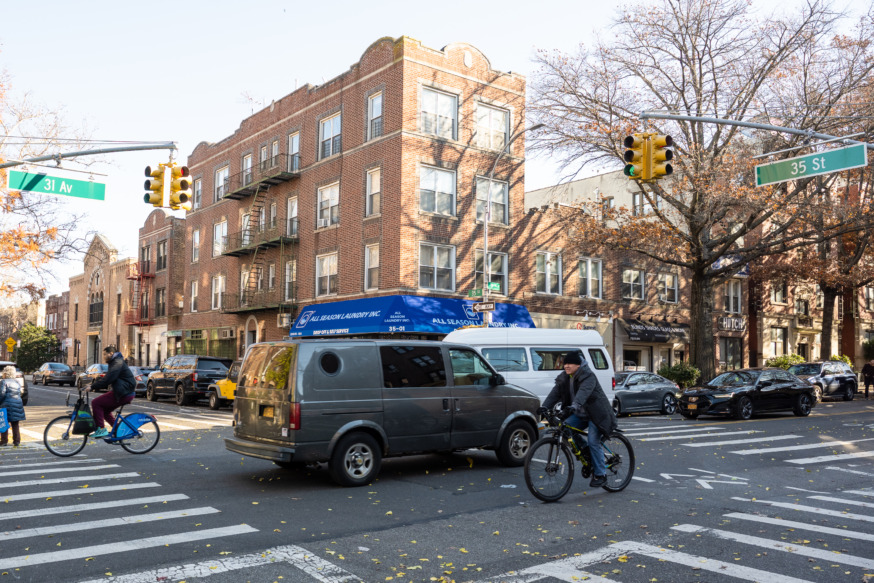
A cyclist rides against traffic on 31st Avenue in Astoria on Nov. 28, 2023. (Photo by Gabriele Holtermann)






